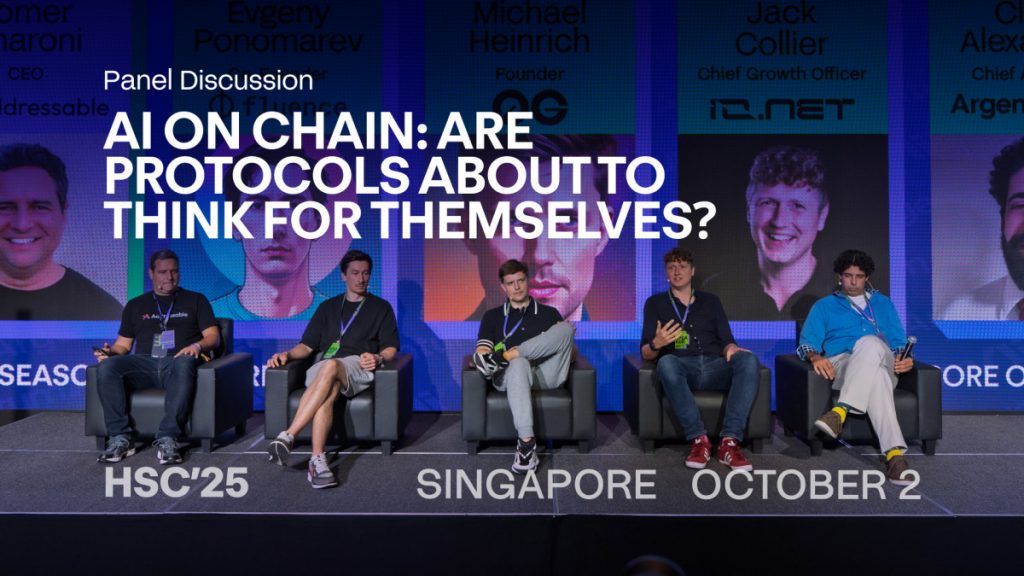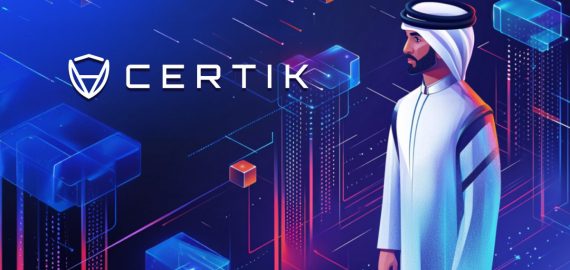Hack Seasons Singapore Panel Explores The Future Of AI Agents, Decentralized Compute, And On-Chain Governance


In Brief
At the Hack Seasons Conference in Singapore, experts discussed the current and future role of AI agents in Web3, covering practical applications, and more while emphasizing that human oversight remains essential for the foreseeable future.

At the beginning of October, the Hack Seasons Conference in Singapore brought together technologists, investors, and innovators from around the world to explore the future of blockchain and AI. One of the most anticipated main stage events was the panel discussion titled “AI On Chain: Are Protocols About To Think For Themselves?” hosted by Tomer Sharoni, CEO of Addressable.
The panel featured a high-profile lineup, including Evgeny Ponomarev, Co-Founder of Fluence, Michael Heinrich, Founder of 0G, Jack Collier, CGO of io.net, and Clark Alexander, Chief AI Officer at Argentum AI. The discussion offered an in-depth exploration of how the intersection of Web3 and AI could shape the digital landscape in the years ahead.
The conversation began with speakers examining the current practical applications of AI agents in production, as well as use cases that remain aspirational or unlikely to materialize. Panelists emphasized the wide range of practical applications for AI agents, noting that the term generally refers to using large language models (LLMs) in business automation. In many cases, AI agents operate without a conversational interface, handling tasks such as customer support, sales automation, data collection, and profiling. While these applications are already widely adopted, the long-term dream remains creating AI agents capable of thinking like humans. Currently, the architecture of existing models cannot replicate human-level intelligence.
Speakers highlighted that AI agents are most effective when used to automate operating system–level tasks. Models have been trained on the artifacts created by humans over millennia, but the full scope of human creativity and innovation extends far beyond what has been documented. As a result, creative work, idea generation, governance, and administration will remain the domain of humans for the foreseeable future. Panelists agreed that, for at least the next fifty years, humans will continue to play a critical role in these processes.
The discussion also explored how AI agents are currently used primarily as internal tools. AI has the potential to provide relevant context that enables humans to make better decisions and enhance creativity within autonomous systems.
While the ultimate goal for some is artificial general intelligence (AGI), the panel acknowledged the significant physical and conceptual limitations of current LLMs. However, the speakers did not rule out the possibility of future algorithms designed to think differently or more like humans, noting that some developers are actively exploring these approaches.
Panelists Explore AI Trading Agents, Decentralized Compute, On-Chain Data, And GPU Governance In The Future Of Crypto And AI
A key topic explored during the panel was trading AI agents. In the cryptocurrency space, self-trading protocols and wallets that aim to generate profits for users are emerging rapidly.
Panelists noted that cryptocurrency trading operates similarly to forex trading. If multiple AI agents are programmed with different trading strategies, they may end up trading against each other. However, if their strategies are highly correlated, the system could collapse, resulting in one dominant winner while others incur losses. In many ways, the dynamics of AI agent trading mirror those of a market.
Other speakers highlighted that, according to research, most AI trading agents still underperform compared to humans. The panel agreed that AI agents remain inefficient because they cannot anticipate emerging patterns or explore novel strategies independently.
Decentralized compute was another major point of discussion. Panelists explained that for those looking to build large GPU networks, decentralized compute offers an alternative to cloud providers like AWS or Google Cloud. A key challenge is convincing large enterprises, such as Fortune 500 companies, to adopt decentralized GPU networks in addition to traditional cloud infrastructure.
Speakers noted that some companies require extremely powerful GPUs to operate at scale. If decentralized providers cannot supply this level of hardware, they will not attract enterprise clients. Additionally, enterprise adoption often depends on security certifications, which decentralized protocols may lack. Without these certifications, companies have limited assurance that sensitive data will remain protected.
Despite these challenges, other speakers argued that decentralized systems have inherent trust advantages. Staking mechanisms allow participants to back the resources they provide, offering a form of accountability. Currently, one of the largest costs of AI is compute, partly because companies feel pressured to secure resources from hyperscalers, often resulting in underutilized hardware—sometimes only 10-15% usage. Decentralized networks allow spare GPU capacity to be monetized efficiently, while consumers pay only for what they use.
The discussion also explored the growing interest in putting data on-chain to ensure provenance, control, and verifiability. Panelists debated whether blockchains could eventually support the training of autonomous AI models in a way that is both efficient and secure.
The panel concluded with a focus on governance in the AI and GPU space, raising questions about who will control GPU supply in the future and how this will shape the broader economy.
Disclaimer
In line with the Trust Project guidelines, please note that the information provided on this page is not intended to be and should not be interpreted as legal, tax, investment, financial, or any other form of advice. It is important to only invest what you can afford to lose and to seek independent financial advice if you have any doubts. For further information, we suggest referring to the terms and conditions as well as the help and support pages provided by the issuer or advertiser. MetaversePost is committed to accurate, unbiased reporting, but market conditions are subject to change without notice.
About The Author
Alisa, a dedicated journalist at the MPost, specializes in cryptocurrency, zero-knowledge proofs, investments, and the expansive realm of Web3. With a keen eye for emerging trends and technologies, she delivers comprehensive coverage to inform and engage readers in the ever-evolving landscape of digital finance.
More articles

Alisa, a dedicated journalist at the MPost, specializes in cryptocurrency, zero-knowledge proofs, investments, and the expansive realm of Web3. With a keen eye for emerging trends and technologies, she delivers comprehensive coverage to inform and engage readers in the ever-evolving landscape of digital finance.



















































